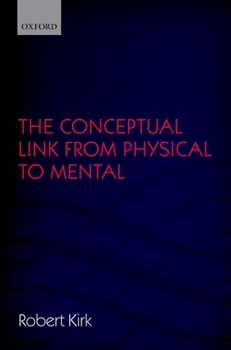Conceptual Link from Physical to Mental
How are truths about physical and mental states related? Physicalism entails that non-physical truths are redescriptions of a world specifiable in narrowly physical terms. In The Conceptual Link from Physical to Mental Robert Kirk argues that physicalists must therefore hold that the physical truth "logico-conceptually" entails the mental truth: it is impossible for broadly logical and conceptual reasons that the former should have held without the latter. "Redescriptive physicalism" is a fresh approach to the physical-to-mental connection that he bases on these ideas. Contrary to what might have been expected, this connection does not depend on analytic truths: there are holistic but non-analytic conceptual links, explicable by means of functionalism--which, he argues, physicalism entails. Redescriptive physicalism should not be confused with "a priori physicalism" although physicalists must maintain that phenomenal truths are logico-conceptually entailed by physical truths, they must deny that they are also entailed a priori. Kripke-inspired "a posteriori physicalism," on the other hand, is too weak for physicalism, and the psycho-physical identity thesis is not sufficient for it. Though non-reductive, redescriptive physicalism is an excellent basis for dealing with the problems that mental causation raises for other non-reductive views. "Cartesian intuitions" of zombies and transposed qualia may seem to raise irresistible objections; Kirk shows that the intuitions are false. As to the "explanatory gap," there is certainly an epistemic gap, but it has a physicalistically acceptable explanation which deals effectively with the problem of how the physical and functional facts fix particular phenomenal facts.
Format:Hardcover
Language:English
ISBN:0199669414
ISBN13:9780199669417
Release Date:April 2013
Publisher:Oxford University Press (UK)
Length:242 Pages
Weight:1.10 lbs.
Dimensions:0.8" x 6.4" x 9.2"
Customer Reviews
0 rating





